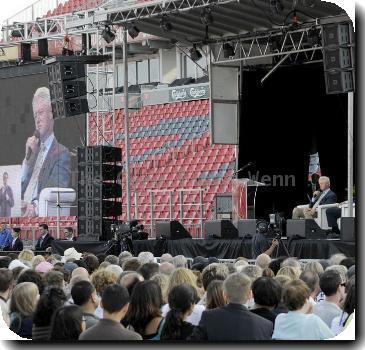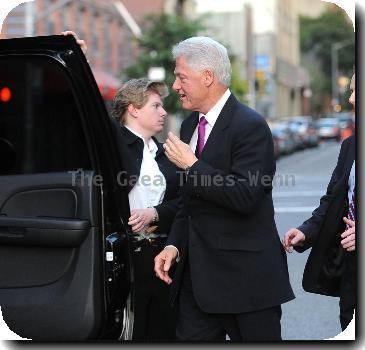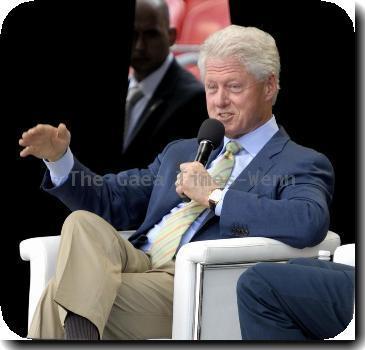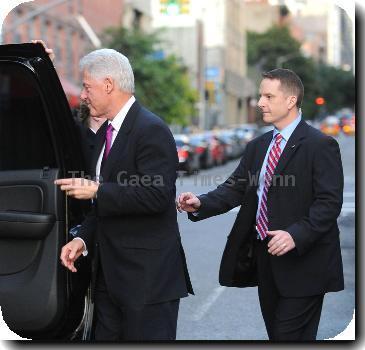Judge keeps gay marriages on hold in Calif. on hold until at least Aug. 18
By Paul Elias, APThursday, August 12, 2010
Judge keeps gay marriages in California on hold
SAN FRANCISCO — The federal judge who struck down California’s gay-marriage ban said Thursday that same-sex weddings can resume next week unless an appeals court intervenes before then.
The news raised hopes among gay couples that they soon will be able to tie the knot after years of agonizing delays.
Judge Vaughn Walker gave opponents of same-sex weddings until Aug. 18 at 5 p.m. to get a ruling from the 9th U.S. Circuit Court of Appeals on whether gay marriage should resume. Gay marriages could happen at that point or be put off indefinitely depending on how the court rules.
Walker struck down the state’s voter-approved gay marriage ban last week in a case many believe is destined for the Supreme Court.
Dozens of gay marriage supporters who had gathered outside San Francisco’s City Hall, a block from the federal courthouse, erupted in cheers when the decision came out. The crowd included a handful of same-sex couples who had arrived early Thursday morning to fill out marriage license applications in hopes that the judge would allow nuptials to commence immediately.
Teresa Rowe, 31, and her partner, Kristin Orbin, 31, said they were still happy with the decision even though the ceremony didn’t happen.
“It’s sad that we have to wait a little longer, but it’s been six years,” Rowe said.
In his original ruling, Walker moved to suspend gay weddings until he could consider arguments from both sides on whether the marriages should be allowed during an appeal of his ruling. He now says gay marriage should resume, but he gave conservatives the extra time to get the appeals court to weigh in.
Charles J. Cooper, lead counsel for the Proposition 8 supporters, said his legal team intends to ask the appeals court to immediately impose a stay of Walker’s ruling, a move that would halt gay marriages while the case is pending before the 9th Circuit.
California voters passed Proposition 8 as a state constitutional amendment in November 2008, five months after the California Supreme Court legalized same-sex unions and an estimated 18,000 same-sex couples already had tied the knot.
Three people protested among the crowd to oppose Walker’s ruling Thursday.
“It’s a really sad day for Californians, for families, for our future and for voters that a federal judge has trampled on the civil rights of voters,” said Luke Otterstad, 24, of Sacramento.
Lawyers for gay couples, California Gov. Schwarzenegger and Attorney General Jerry Brown filed legal motions Friday asking that same-sex marriages be allowed to resume immediately.
Walker said on Thursday that ban proponents didn’t convince him that anyone would be harmed by allowing same-sex marriages to resume.
“The evidence at trial showed, however, that Proposition 8 harms the state of California,” Walker said.
Walker also turned aside arguments that marriages performed now could be thrown into legal chaos if Proposition 8 is later upheld by an appeals court.
But Walker said such weddings would appear to be legal even if the ban is later reinstated. He pointed to the 18,000 same-sex couples who married legally in the five months that gay marriage was legal in California as proof.
Walker also said that no one can claim harm by allowing same-sex weddings to go forward, but banning them harms gays.
Finally, Walker said it also appears doubtful that the opponents of the ban have any right to appeal his decision striking down a state law that he said should have been defended by either Gov. Schwarzenegger and Attorney General Brown.
Schwarzenegger and Brown each last week urged Walker to allow same-sex marriages to resume immediately and its unlikely they will join the appeal of Proposition 8.
“I am pleased to see Judge Walker lift his stay and provide all Californians the liberties I believe everyone deserves,” Schwarzenegger said after the ruling.
The case now goes before a special “motions panel” of three judges at the appeals court, the largest and busiest federal appeals court in the nation with jurisdiction over nine western states.
The panel consists of two judges appointed by Democrats and a third by a Republican.
President Ronald Reagan appointed Judge Edward Leavy to the appeals court in 1987. Leavy, who is semi-retired, has served as judge in the state and federal courts in Oregon since 1957.
President Bill Clinton nominated Judge Michael Daly Hawkins to the court in 1994 and Judge Sidney Thomas in 1995.
Hawkins, based in Phoenix, served as Arizona’s U.S. Attorney under President Jimmy Carter and also worked as a special prosecutor for the Navajo Nation from 1985 to 1989.
Thomas, who keeps his chambers in Bozeman, Mont., made President Obama’s short list to fill the U.S. Supreme Court vacancy that was filled last week by Elena Kagan.
A new three-judge panel will be chosen sometime next year to decide the appeal. Lawyers for both sides have been ordered to file their legal arguments by the end of the year.
Associated Press Writers Lisa Leff and Trevor Hunicutt contributed to this report.
Tags: Bill Clinton, California, Constitutional Amendments, Couples, Judge walker, Judicial Appointments And Nominations, National Courts, North America, Relationships, San Francisco, United States



